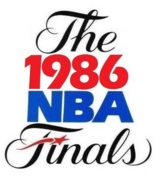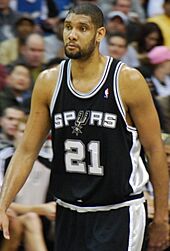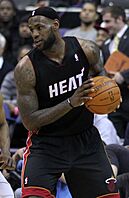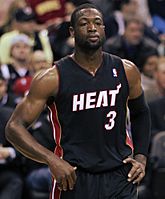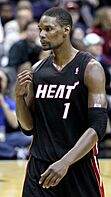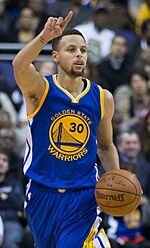NBA Finals facts for kids
The NBA Finals is the yearly championship series of the National Basketball Association (NBA). It's where the best teams from the Eastern and Western Conference play each other. They compete in a best-of-seven series, meaning the first team to win four games becomes the league champion. The winning team gets the Larry O'Brien Championship Trophy. This trophy replaced the older Walter A. Brown Trophy in 1976–77.
The series had different names before. It was first called the BAA Finals until 1949–50. That's when the Basketball Association of America (BAA) joined with the National Basketball League (NBL) to create the NBA. Later, it was known as the NBA World Championship Series from 1950 to 1985. Since 1986, it's been called the NBA Finals. Since 2018, it's officially known as the NBA Finals presented by YouTube TV because of sponsorship.
The NBA Finals used to have a 2–2–1–1–1 game format. This meant the first two games were at one team's home, then two at the other's, then one, then one, then one. In 1985, to make travel easier, it changed to a 2–3–2 format. The team with the better record hosted the first two and last two games. But in 2014, they went back to the 2–2–1–1–1 format. The team with the better regular season record hosts games 1, 2, 5, and 7 (if needed). The other team hosts games 3, 4, and 6 (if needed).
A total of 22 teams have won the NBA Finals. The Oklahoma City Thunder won the most recent one. It was their first title since moving to Oklahoma City, and their second overall, including their time as the Seattle SuperSonics.
Contents
- History of the NBA Finals
- Early Years: Lakers Dominate (1946–1956)
- Celtics Dynasty: A Winning Streak (1957–1969)
- Many Champions: The 1970s (1970–1979)
- Rivalries and "Bad Boys" (1980–1990)
- Bulls Dynasty: Michael Jordan's Era (1991–1998)
- Spurs and Lakers: A New Era of Dominance (1999–2010)
- LeBron and Warriors: Modern Dynasties (2011–2022)
- Recent Champions (2023–Present)
- Sponsorship
- Team Records in the Finals
- Top Player Records in the Finals
- See also
History of the NBA Finals
Early Years: Lakers Dominate (1946–1956)
The first years of professional basketball were mostly ruled by the Minneapolis Lakers. They won five of the first ten championships. The Philadelphia Warriors also won two titles, including the very first one in 1947.
The Basketball Association of America started in 1946. In April 1947, the Philadelphia Warriors beat the Chicago Stags to win the first BAA Finals. The next year, the Warriors lost to the Baltimore Bullets. The Baltimore Bullets are the only team that no longer exists to have won a championship.
In 1948, the Minneapolis Lakers, led by future Hall of Famer George Mikan, won the championship in a different league, the National Basketball League. They then joined the BAA. The Lakers won the last BAA championship in 1949. After that, the BAA and NBL merged to form the NBA. The Lakers won the first NBA championship in 1950. This made them the first team to win two championships in a row.
In 1951, the Rochester Royals beat the New York Knicks. This was the only Finals where both teams were from the same state. The Knicks then lost three Finals in a row. Meanwhile, the Lakers won three straight Finals from 1952 to 1954. This was the first "three-peat" (winning three times in a row) in NBA history. They won five titles in six seasons!
Most of the early champion teams later moved to different cities.
Celtics Dynasty: A Winning Streak (1957–1969)
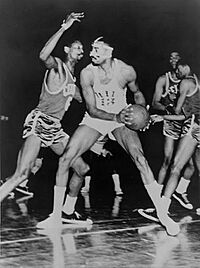
The Boston Celtics had an amazing run, winning 11 of 12 NBA Finals they played in over 13 seasons. This included an incredible eight championships in a row from 1959 to 1966. During this time, the St. Louis Hawks won their only title. The Philadelphia 76ers also won their first title after moving from Syracuse.
The Celtics' success was led by their star center, Bill Russell. Even when facing teams with superstar Wilt Chamberlain, Russell's Celtics usually found a way to win.
In 1964, Chamberlain's team, the San Francisco Warriors, reached the Western Division championship. But they couldn't beat the Celtics. The next season, Chamberlain joined the Philadelphia 76ers.
The first playoff battle between Russell and Chamberlain was in 1966. Boston won that series 4–1. The next year, the 76ers' coach helped Chamberlain play more as a team. This led to a record 68 wins and a victory over the Celtics. They then won the 1967 Finals. In 1968, Boston made an amazing comeback from being down 3–1 against Philadelphia. They then beat the Los Angeles Lakers in the Finals.
In 1969, the Celtics were an older team with many injuries. They barely made the playoffs. The Lakers, with Chamberlain, Jerry West, and Elgin Baylor, were expected to win easily. But the Celtics surprised everyone. In Game 4, with the Lakers leading late, a turnover led to Sam Jones scoring the winning basket for Boston. This tied the series.
The series went to Game 7 in Los Angeles. The Lakers' owner even hung balloons in the arena, expecting a win! West was injured, but still played. Russell used West's limited movement to create fast breaks for the Celtics. Boston got an early lead and held on to win 108–106. They won their eleventh championship in 13 years. This win is seen as the end of the Celtics' amazing dynasty.
Many Champions: The 1970s (1970–1979)
The 1970s were different. Ten different teams reached the Finals, and eight different teams won a championship. This was the most variety of any decade. The Boston Celtics and New York Knicks each won twice.
In 1970, the Knicks and Lakers played a famous Finals series. In Game 3, Jerry West made a shot from 60 feet away to tie the game. It's one of the most famous shots ever! But the Knicks won in overtime and eventually won the series in 7 games. In Game 7, an injured Willis Reed bravely returned to play for the Knicks, inspiring his team to victory. The next season, the Milwaukee Bucks, led by Oscar Robertson and Kareem Abdul-Jabbar, won their first title.
Two seasons after their Finals loss, the Lakers won 33 games in a row, an NBA record! They also set a record for most wins in a season with 69. They then won the championship, their first since moving to Los Angeles. The Knicks won the Finals again a year later. The Celtics won their 12th title in 1974.
The late 1970s saw more Western teams win. In 1975, the Golden State Warriors swept the Washington Bullets 4–0. In 1976, the Phoenix Suns, a young team, made a surprising run to the Finals. They were nicknamed the "Sunderella Suns." They faced the Celtics. Game 5 went into three overtimes, with Boston winning a close game. The Celtics then won their 13th championship in Game 6.
Other teams won their first titles in the 1970s: the New York Knicks (1970), Milwaukee Bucks (1971), Portland Trail Blazers (1977), and Washington Bullets (1978). The Seattle SuperSonics got revenge on the Bullets the next year, winning their first title in 1979.
Rivalries and "Bad Boys" (1980–1990)
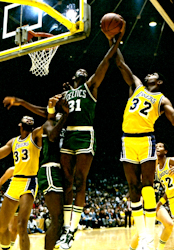
The 1980s were famous for the rivalry between the Boston Celtics and the Los Angeles Lakers. Together, they won eight championships in this decade. Rookie Magic Johnson led the "Showtime Lakers" to the 1980 NBA Finals. They played against Julius Erving and the Philadelphia 76ers. The Lakers led 3–2, but Kareem Abdul-Jabbar was injured for Game 6. Magic Johnson, a point guard, played every position, scoring 42 points! He won his first championship and Finals MVP award, the only rookie to do so.
Boston reached the 1981 NBA Finals with their "Big Three": Larry Bird, Kevin McHale, and Robert Parish. They beat the Houston Rockets in 6 games.
The Lakers returned to the Finals in 1982, led by new coach Pat Riley. They again faced the 76ers and won in 6 games. The 76ers then traded for Moses Malone, the league's MVP. With Malone and Erving, the 76ers swept the Lakers in the 1983 NBA Finals.
The Celtics and Lakers met in the Finals three times in the 80s: 1984, 1985, and 1987. In 1984, the Celtics won a close 4–3 series. The final game had a huge TV audience. The Lakers won in 1985 and 1987. In 1985, they lost Game 1 badly (by 34 points!) in what was called the "Memorial Day Massacre," but still won the series. In 1987, Magic Johnson made a famous hook shot in Game 4 to help the Lakers win.
In the next two seasons, the Detroit Pistons became the top team. The Lakers won their second straight title in the 1988 NBA Finals, beating the Pistons in 7 games. They were the first team to win back-to-back titles since 1969. The Pistons, known as the "Bad Boys" for their tough play, swept the Lakers in the 1989 rematch. Led by Joe Dumars, Isiah Thomas, Bill Laimbeer, and Dennis Rodman, the Pistons won again in 1990, beating the Portland Trail Blazers.
Bulls Dynasty: Michael Jordan's Era (1991–1998)
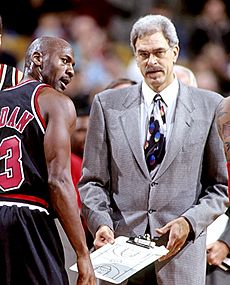
The 1990s were mostly about the Chicago Bulls. Led by coach Phil Jackson and stars Michael Jordan and Scottie Pippen, the Bulls won six titles in six Finals appearances from 1991 to 1998. The only other team to win during this time was the Houston Rockets, who won in 1994 and 1995.
The Bulls' first championship was against the Los Angeles Lakers. This was Magic Johnson's last Finals. The series was seen as a battle between the older Johnson and the rising Jordan. The Lakers won Game 1. But then, Pippen guarded Johnson, letting Jordan focus on scoring. The Bulls won the next four games to win 4–1. The Bulls returned to the Finals the next year against Clyde Drexler and the Portland Trail Blazers. Chicago won Game 1 by 33 points. Jordan set a record for most three-pointers in a first half. The Bulls won the series in six games.
In 1993, the Bulls played the Phoenix Suns, led by MVP Charles Barkley. The Suns won Game 3 in Chicago in triple overtime. But the Bulls came back to win Game 4, with Jordan scoring 55 points. Chicago won the series in Game 6 with a last-second three-pointer by John Paxson. The Bulls became the third team to "three-peat." After this win, Jordan retired from basketball to play baseball.
After Jordan left, the Houston Rockets, led by Hakeem Olajuwon, won the 1994 and 1995 titles. Olajuwon became the only player to win the NBA MVP, Defensive Player of the Year, and Finals MVP awards in the same season.
Jordan returned to basketball in 1995. The next season, with Dennis Rodman joining the team, the Bulls set an NBA record with 72 regular season wins. They dominated the playoffs, then faced the Seattle SuperSonics in the Finals. The Bulls took a 3–0 lead. Seattle won the next two games after their point guard, Gary Payton, started guarding Jordan. Jordan adjusted his game, and the Bulls won Game 6 for their fourth title.
In 1997 and 1998, the Bulls played the Utah Jazz twice in the Finals. The Jazz, led by John Stockton and Karl Malone, lost both times to the Bulls in six games. In both series, Chicago won with a game-winning shot in Game 6. Steve Kerr hit one in 1997, and Jordan hit one in 1998. This gave Chicago their sixth NBA championship and their second "three-peat." After this, coach Phil Jackson retired, and many players, including Jordan and Pippen, left the Bulls.
Spurs and Lakers: A New Era of Dominance (1999–2010)
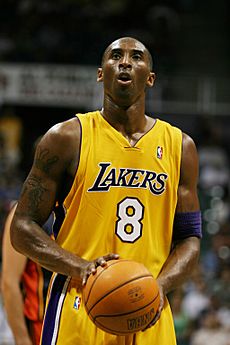
The 2000s were mostly dominated by the San Antonio Spurs and Los Angeles Lakers. They appeared in 11 Finals combined and won 9 championships in 12 seasons.
The Spurs won four championships: 1999, 2003, 2005, and 2007. In the 1999 Finals, the Spurs, led by David Robinson and Tim Duncan, had a strong defense. They beat the New York Knicks, who were the first 8th-seed team to reach the Finals. In the 2003 Finals, the Spurs beat the New Jersey Nets in six games. This was the first Finals between two former ABA teams. In Game 6, Duncan almost had a "quadruple-double" (double digits in four stats). The Spurs also beat the Detroit Pistons in 2005 and swept LeBron James's Cleveland Cavaliers in 2007. Tony Parker became the first European player to win Finals MVP in 2007.
The Lakers won five championships in this period, including a "three-peat" from 2000 to 2002. They were led by Shaquille O'Neal and Kobe Bryant. In their 2001 playoff run, the Lakers swept their first three series. They then beat the Allen Iverson-led Philadelphia 76ers in five games. They had an amazing 15–1 playoff record. The Lakers also beat the Indiana Pacers in 2000 and swept the New Jersey Nets in 2002.
In 2003, veteran stars Gary Payton and Karl Malone joined the Lakers. Many thought they would easily win the 2004 championship. But the Detroit Pistons upset them, winning in five games. The Pistons returned to the Finals the next year, losing to the Spurs in seven games.
After some issues, O'Neal was traded to the Miami Heat in 2004. He teamed up with rising star Dwyane Wade. They led the Heat to a championship in 2006, beating the Dallas Mavericks.
The Lakers returned to the Finals in 2008 against the Boston Celtics. This renewed their old rivalry, marking their 11th Finals matchup. The Celtics, with their "Big Three" of Ray Allen, Kevin Garnett, and Paul Pierce, beat the Lakers in six games. The Lakers bounced back, winning the 2009 NBA Finals against the Orlando Magic. They met the Celtics again in 2010, winning the last two games at home. Coach Phil Jackson won his 11th NBA title, breaking Red Auerbach's record.
LeBron and Warriors: Modern Dynasties (2011–2022)
The 2010s were defined by LeBron James. He played in nine NBA Finals in ten seasons, winning four titles with three different teams. This decade also saw the rise of the Golden State Warriors. They became a dominant force, reaching six NBA Finals and winning four titles in eight seasons.
In 2010, the Miami Heat signed James and Chris Bosh to join Dwyane Wade. This new "Big Three" was expected to win many titles. They reached four straight Finals. In 2011, they lost to the Dallas Mavericks, who were big underdogs. The Heat returned to the Finals the next year against a young Oklahoma City Thunder team. Miami won in five games, and James won his first championship. The Heat won again in 2013 against the San Antonio Spurs. Game 6 was a famous comeback win for Miami. The Heat tried for a "three-peat" in 2014 against the Spurs again. But this time, San Antonio won in five games, giving Tim Duncan his fifth and final title.
In 2014, James returned to the Cleveland Cavaliers. He teamed up with Kyrie Irving and Kevin Love to form another "Big Three." The Cavaliers played in the next four Finals, all against the Golden State Warriors. They were the first two teams to play each other in more than two Finals in a row. The Warriors won first in 2015. The next season, the Warriors set a record with 73 regular season wins. They took a 3–1 lead in the 2016 NBA Finals. But James and Irving led the Cavaliers to two straight wins, forcing Game 7. In Game 7, LeBron James made a famous "chase-down block" on Iguodala. Irving then hit a three-pointer to take the lead. Cleveland won the title, ending the city's long championship drought.
After that, the Warriors signed Kevin Durant. Many thought they were one of the greatest teams ever. In 2017, the Warriors set a playoff record with 15 straight wins. They won the Finals in five games. They then swept the Cavaliers in 2018.
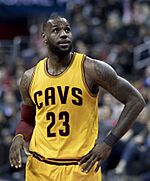
The Warriors made their fifth straight Finals appearance in 2019 against the Kawhi Leonard-led Toronto Raptors. Toronto won in six games after injuries to Durant and Klay Thompson. This was the first NBA title for a team outside the United States.
LeBron James joined the Los Angeles Lakers in 2018. He led them to the 2020 NBA Finals against the Miami Heat. The Lakers won 4–2, getting their 17th title and tying the Boston Celtics' record. LeBron James won Finals MVP for the fourth time, the first player to win it with three different teams.
The 2021 NBA Finals saw the Milwaukee Bucks beat the Phoenix Suns. This was the first Finals since 1971 where no player had won a championship before.
After missing the playoffs, the Warriors returned to the 2022 NBA Finals. They beat the Boston Celtics in six games for their fourth championship in eight seasons.
Recent Champions (2023–Present)
The Denver Nuggets reached their first Finals ever in 2023. They beat the Miami Heat in five games. Nikola Jokić was named Finals MVP. He was the lowest-drafted player (41st overall) to win the award. The Boston Celtics defeated the Dallas Mavericks in the 2024 NBA Finals. This gave them their record 18th NBA title, breaking the tie with the Los Angeles Lakers.
The Oklahoma City Thunder beat the Indiana Pacers in seven games in the 2025 NBA Finals. This marked the seventh different champion in seven years, the longest streak of different winners in NBA history.
Sponsorship
Since 2018, YouTube TV has been the official sponsor of the NBA Finals.
Team Records in the Finals
Finals Appearances (Series Wins and Losses)
The numbers below show how many times teams have reached the Finals and how many series they won or lost.
| No. | Team | W | L | Win% | Most recent appearance | Most recent title | Notes |
|---|---|---|---|---|---|---|---|
| 32 | Minneapolis/Los Angeles Lakers | 17 | 15 | .531 | 2020 | 2020 | 5–1 in Minneapolis and 12–14 in Los Angeles. They have reached the NBA Finals more than any other team and have appeared in every decade since the 1940s. They also won three straight titles in Minneapolis (1952–1954) and another three straight in Los Angeles (2000–2002). The Lakers have beaten nine different teams in the Finals and lost to five, both records. They are one of five teams to reach four Finals in a row. |
| 23 | Boston Celtics | 18 | 5 | .783 | 2024 | 2024 | Won eight straight titles from 1959 to 1966. They are the most successful team in the NBA Finals with 18 championships. Three of their five Finals losses were against the Lakers. They appeared in a record 10 consecutive NBA Finals. |
| 12 | Philadelphia/San Francisco/Golden State Warriors | 7 | 5 | .583 | 2022 | 2022 | 2–1 in Philadelphia and 5–4 in California. They won the first championship and another title in Philadelphia. They later won five more as the Golden State Warriors, including four in eight years (2015–2022). They are the second team to appear in five consecutive NBA Finals. |
| 9 | Syracuse Nationals/Philadelphia 76ers | 3 | 6 | .333 | 2001 | 1983 | 1–2 in Syracuse and 2–4 in Philadelphia. They won one title in Syracuse, and two more after moving to Philadelphia. Five of their six losses were against the Lakers. |
| 8 | New York Knicks | 2 | 6 | .250 | 1999 | 1973 | In their most recent appearance, they were the first eighth seed to reach the Finals. Five of their appearances and both titles were against the Lakers. |
| 7 | Fort Wayne/Detroit Pistons | 3 | 4 | .429 | 2005 | 2004 | 0–2 in Fort Wayne and 3–2 in Detroit. They appeared in three straight NBA Finals, winning back-to-back in 1989 and 1990. Both losses in Detroit came in Game 7s. |
| 7 | Miami Heat | 3 | 4 | .429 | 2023 | 2013 | Udonis Haslem played in all their Finals appearances. Coach Erik Spoelstra was head coach in six Finals and assistant in one. They are one of five teams to reach four Finals in a row. In their most recent appearance, they were the first team to reach the Finals after qualifying through the play-in tournament. |
| 6 | Chicago Bulls | 6 | 0 | 1.000 | 1998 | 1998 | All six titles were with coach Phil Jackson and players Michael Jordan and Scottie Pippen. They won their titles with two "three-peats" (1991–1993 and 1996–1998). They are the only active NBA team with multiple Finals appearances and no losses. |
| 6 | San Antonio Spurs | 5 | 1 | .833 | 2014 | 2014 | All five titles were with Tim Duncan and coach Gregg Popovich. They were the first team to move from the ABA to the NBA and then win a championship. |
| 5 | Cleveland Cavaliers | 1 | 4 | .200 | 2018 | 2016 | LeBron James played in all five of their Finals appearances. The Cavaliers appeared in four straight Finals from 2015 to 2018, all against the Golden State Warriors, winning in 2016. They are one of five teams to reach four Finals in a row. |
| 5 | Seattle SuperSonics/Oklahoma City Thunder | 2 | 3 | .400 | 2025 | 2025 | 1–2 as the Seattle SuperSonics and 1–1 as the Oklahoma City Thunder. They are the only team since 1977 to win a title in one city and then move. |
| 4 | Houston Rockets | 2 | 2 | .500 | 1995 | 1995 | Won two championships in a row with Hakeem Olajuwon and coach Rudy Tomjanovich. Their 1995 win was as the 6th seed, the lowest seeded team to win a championship. Both losses were against the Boston Celtics. |
| 4 | St. Louis/Atlanta Hawks | 1 | 3 | .250 | 1961 | 1958 | All appearances were when the team was in St. Louis. They reached four NBA Finals in five years, all against the Boston Celtics. |
| 4 | Baltimore/Washington Bullets/Washington Wizards | 1 | 3 | .250 | 1979 | 1978 | 0–1 as the Baltimore Bullets, and 1–2 as the Washington Bullets. All their Finals appearances were between 1971 and 1979, featuring Wes Unseld. |
| 3 | Milwaukee Bucks | 2 | 1 | .667 | 2021 | 2021 | Won in the 1971 and 2021 Finals. Their 1971 and 1974 appearances featured teams with Oscar Robertson and Kareem Abdul-Jabbar. |
| 3 | Portland Trail Blazers | 1 | 2 | .333 | 1992 | 1977 | Their only title was won with Bill Walton. The team lost two Finals with Clyde Drexler. |
| 3 | Dallas Mavericks | 1 | 2 | .333 | 2024 | 2011 | 1-1 against the Miami Heat and 0-1 against the Boston Celtics. Their first championship team was led by Dirk Nowitzki. |
| 3 | Phoenix Suns | 0 | 3 | .000 | 2021 | None | Lost in the 1976, 1993 and 2021 Finals to the Celtics, Bulls and Bucks. They have the best historical record and most Finals appearances among teams that have not won a title. |
| 2 | Utah Jazz | 0 | 2 | .000 | 1998 | None | Both appearances were with coach Jerry Sloan and players Karl Malone and John Stockton. They lost both times to the Bulls in six games. |
| 2 | New Jersey/Brooklyn Nets | 0 | 2 | .000 | 2003 | None | All appearances were when the team was in New Jersey. |
| 2 | Orlando Magic | 0 | 2 | .000 | 2009 | None | They lost both of their Finals appearances, winning only one game in total. |
| 2 | Indiana Pacers | 0 | 2 | .000 | 2025 | None | Their first appearance in 2000 was led by Reggie Miller and coach Larry Bird, losing to Shaquille O'Neal, Kobe Bryant and the Lakers. Their second appearance in 2025 was led by Tyrese Haliburton and Pascal Siakam against Shai Gilgeous-Alexander and the Thunder. |
| 1 | Baltimore Bullets | 1 | 0 | 1.000 | 1948 | 1948 | This team no longer exists. It is the only championship-winning team to have folded. |
| 1 | Rochester Royals/Kansas City/Sacramento Kings | 1 | 0 | 1.000 | 1951 | 1951 | Their only appearance in the NBA Finals was as the Rochester Royals. |
| 1 | Toronto Raptors | 1 | 0 | 1.000 | 2019 | 2019 | Their only appearance in the NBA Finals. They are the first and only team based outside the United States to win an NBA title or reach the NBA Finals. |
| 1 | Denver Nuggets | 1 | 0 | 1.000 | 2023 | 2023 | Their only appearance as of 2023. |
| 1 | Chicago Stags | 0 | 1 | .000 | 1947 | None | This team no longer exists. |
| 1 | Washington Capitols | 0 | 1 | .000 | 1949 | None | This team no longer exists. |
Active Teams Without a Finals Appearance
| Team | No. of seasons | Founded | Other achievements |
|---|---|---|---|
| Buffalo Braves/San Diego/Los Angeles Clippers | 56 | 1970 | Reached the Western Conference finals in 2021. They are the oldest active team that has never reached the Finals. |
| Minnesota Timberwolves | 37 | 1989 | Reached the Western Conference finals in 2004, 2024, and 2025. |
| Charlotte Bobcats/Hornets* | 36 | 1988 | Never reached the Eastern Conference finals. They reached the second round four times (1993, 1998, 2001, 2002). |
| Vancouver/Memphis Grizzlies | 31 | 1995 | Reached the Western Conference finals in 2013. |
| New Orleans/Oklahoma City Hornets/Pelicans* | 24 | 2002 | Never reached the Western Conference finals. They reached the second round twice (2008, 2018). |
(*) The original Hornets team moved to New Orleans. Charlotte then got a new team called the Bobcats. In 2013, the New Orleans team became the Pelicans and kept the history from 2002-2013. In 2014, the Bobcats became the Charlotte Hornets again and got the history from 1988-2002.
Individual Game Records in the Finals
This table shows the win and loss records for individual games played in the NBA Finals.
| No. | Team | W | L | Win% | Notes |
|---|---|---|---|---|---|
| 185 | Los Angeles Lakers | 93 | 92 | .503 | They have played the most games in the Finals. Their record is 20–15 in Minneapolis and 73–77 in Los Angeles. They won 4–2 in their last Finals appearance in 2020. |
| 129 | Boston Celtics | 81 | 53 | .604 | They recorded the first ever sweep in the Finals (winning 4-0). They won 4–1 in their last Finals appearance in 2024. |
| 65 | Golden State Warriors | 38 | 27 | .585 | Includes records of 10–6 in Philadelphia, 3–8 in San Francisco, and 25–13 in their current form. They won 4–2 in their last Finals appearance in 2022. |
| 53 | Philadelphia 76ers | 24 | 29 | .453 | Includes a record of 9–11 in Syracuse, and 15–18 in Philadelphia. They lost 4–1 in their last Finals appearance in 2001. |
| 48 | New York Knicks | 20 | 28 | .417 | They lost 4–1 in their last Finals appearance in 1999. |
| 41 | Miami Heat | 18 | 23 | .439 | They lost 4–1 in their last Finals appearance in 2023. |
| 40 | Detroit Pistons | 22 | 18 | .550 | Includes a record of 4–8 in Fort Wayne, and 18–10 in Detroit. They lost 4–3 in their last Finals appearance in 2005. |
| 35 | Chicago Bulls | 24 | 11 | .686 | They won 4–2 in their last Finals appearance in 1998. |
| 34 | San Antonio Spurs | 23 | 11 | .676 | They won 4–1 in their last Finals appearance in 2014. |
| 26 | Cleveland Cavaliers | 7 | 19 | .269 | They lost 4–0 in their last Finals appearance in 2018. They are also the only team in the Finals to come back from a 3–1 deficit (in 2016). |
| 25 | Atlanta Hawks | 11 | 14 | .440 | All their Finals appearances were when the team was in St. Louis. |
| 23 | Houston Rockets | 12 | 11 | .522 | They won 4–0 in their last Finals appearance in 1995. |
| 23 | Oklahoma City Thunder | 10 | 13 | .435 | Includes a record of 9–9 in Seattle, and 1–4 in Oklahoma City. They lost 1–4 in their last Finals appearance in 2012. |
| 20 | Washington Wizards | 5 | 15 | .250 | Includes a record of 0–4 in Baltimore and 5–11 in Washington, all as the Bullets. |
| 18 | Phoenix Suns | 6 | 12 | .333 | They lost 4–2 in their last Finals appearance in 2021. |
| 17 | Milwaukee Bucks | 11 | 6 | .647 | They won 4–2 in their last Finals appearance in 2021. |
| 17 | Portland Trail Blazers | 7 | 10 | .412 | They lost 4–2 in their last Finals appearance in 1992. |
| 17 | Dallas Mavericks | 7 | 10 | .412 | They lost 4–1 in their last finals appearance in 2024. |
| 12 | Utah Jazz | 4 | 8 | .333 | They lost 4–2 in both Finals appearances (1997 and 1998), both times against the Bulls. |
| 10 | Brooklyn Nets | 2 | 8 | .200 | All their Finals appearances were when the team was in New Jersey. They lost 4–2 in their last Finals appearance in 2003. |
| 9 | Orlando Magic | 1 | 8 | .111 | They lost 4–1 in their last Finals appearance in 2009. |
| 7 | Sacramento Kings | 4 | 3 | .571 | All their appearances were when the team was in Rochester. |
| 6 | Baltimore Bullets | 4 | 2 | .667 | This team no longer exists. It is the only championship-winning team to have folded. |
| 6 | Toronto Raptors | 4 | 2 | .667 | They won 4–2 in their only Finals appearance in 2019. |
| 6 | Indiana Pacers | 2 | 4 | .333 | They lost 4–2 in their only Finals appearance in 2000. |
| 6 | Washington Capitols | 2 | 4 | .333 | This team no longer exists. |
| 5 | Denver Nuggets | 4 | 1 | .800 | They won 4–1 in their only Finals appearance in 2023. |
| 5 | Chicago Stags | 1 | 4 | .200 | This team no longer exists. |
Top Player Records in the Finals
These are some of the best individual player achievements in the NBA Finals.
- Career Records
- Most years in Finals (12) – Bill Russell
- Most games played in Finals (70) – Bill Russell
- Most career points in Finals (1,679) – Jerry West
- Most career assists in Finals (584) – Magic Johnson
- Most career rebounds in Finals (1,718) – Bill Russell
- Most career blocks in Finals (116) – Kareem Abdul-Jabbar
- Most career steals in Finals (102) – Magic Johnson
- Most career turnovers in Finals (196) – LeBron James
- Most career three-point field goals in Finals (152) – Stephen Curry
- Most career free throws made in Finals (453) – Jerry West
- Records in One Series
- Most points, one series (284) – Elgin Baylor (1962)
- Most assists, one series (95) – Magic Johnson (1984)
- Most rebounds, one series (189) – Bill Russell (1962)
- Most blocks, one series (32) – Tim Duncan (2003)
- Most steals, one series (20) – Isiah Thomas (1988)
- Most turnovers, one series (31) – Magic Johnson (1984) and LeBron James (2016)
- Most three-point field goals, one series (32) – Stephen Curry (2016)
- Most free throws made, one series (82) – Elgin Baylor (1962)
- Records in One Game
- Most points, one game (61) – Elgin Baylor (1962)
- Most assists, one game (21) – Magic Johnson (1984)
- Most rebounds, one game (40) – 2x Bill Russell (1960) and (1962)
- Most blocks, one game (9) – Dwight Howard (2009)
- Most steals, one game (7) – Robert Horry (1995)
- Most turnovers, one game (10) – Magic Johnson (1980)
- Most three-point field goals, one game (9) – Stephen Curry (2018)
- Most free throws made, one game (21) – Dwyane Wade (2006)
- Total Points (in all Finals games played)
- Jerry West – 1,679
- LeBron James – 1,562
- Kareem Abdul-Jabbar – 1,317
- Michael Jordan – 1,176
- Elgin Baylor – 1,161
- Bill Russell – 1,151
- Sam Jones – 1,143
- Tom Heinsohn – 1,037
- John Havlicek – 1,020
- Magic Johnson – 971
- Points Per Game Average (minimum 10 games played in Finals)
- Rick Barry – 36.3
- Michael Jordan – 33.6
- Jerry West – 30.5
See also
 In Spanish: Anexo:Finales de la NBA para niños
In Spanish: Anexo:Finales de la NBA para niños
- List of NBA champions
- List of NBA players with most championships
- List of NBA championship head coaches
- NBA G League Finals
 | Kyle Baker |
 | Joseph Yoakum |
 | Laura Wheeler Waring |
 | Henry Ossawa Tanner |


